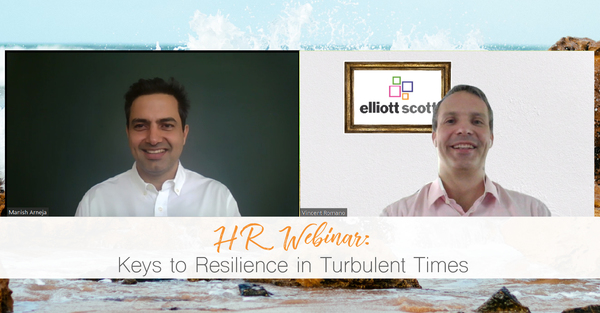Elliott Scott HR, in partnership with The Resilience Institute, held a webinar on 'Keys to Resilience in Turbulent Times' on Tuesday, 12th May. Manish Arneja, Managing Partner - SEA at The Resilience Institute, took us through some basic but core practices to help build our Resilience. Coronavirus has turned our world upside down and it will impact our return to the office. We can take this time as an opportunity to grow and perhaps learn new skills and new rituals to implement in our lives. Every day multiple events happen all around us and we can incorporated Resilience into how we respond to these.
Resilience can be defined as “Our ability to respond to the events life throws at us in a much more 'choiceful’ way ”. When we go to the gym we build muscle. Resilience can be built the same way; by gradually building it through regular and focused practices. Manish shared five key steps to develop Resilience in these turbulent times:
- Self Check-In During the day.
- We check in with our children, partners, teams and colleagues to ask how they are, but many of us forget to ask the same question introspectively to ourselves. We may not realise but many of us don't even spend five minutes a day checking in with ourselves. To overcome this, we should self-check in three to four times a day by simply asking the question, “How am I”? Our Resilience Spiral can go up and down multiple times during the day. It helps us to understand how we currently feel - Am I overwhelmed, fatigued, distressed or am I at my best, creative, focused, fulfilled, connected? Create Calm In this crisis or during any challenging time there is a high possibility that we can be more fragile or anxious. It is absolutely normal to feel those emotions. We have to be self-aware, as sometimes we can stay in that zone for a long period of time and the stress this creates becomes the norm.
- As soon as you wake up you check your phone, emails, WhatsApp and your heart rate starts to go up. Even if you are going for a walk your mind is restless because you have activated the stress response in your body. There is a simple key to practice to overcome this situation. It is just like a handbrake to move your stress response and restore calm. Typically, we take 14 to 15 breaths per minute and on a stressful situation we shrink to a breathing cycle of six breath every minute. Manish recommended to take four seconds to inhale and six seconds to exhale, and by doing so we engage our diaphragm. If we practice this for eight minutes a day we can train ourselves and we will be more resilient in stressful situations.
- Power Up Energy (Energising your Body) Our choices are dependent on resources, especially our energy resources and cognitive reserves in our body. In many parts of the globe, lockdown is set to continue for a while so we need to be mindful of how we are using our energy throughout the day. To manage cognitive load in these times we should:
- Be selective in what we consume. Internet usage has gone up, we browse news, social media and emails and that makes us consume more information. The more we consume/multitask, the more we drain our brain, so be selective of what you’re consuming;
- Create a primary 'to-do' list of one to five items and ensure the list is not exhaustive; otherwise, at the end of the day, you will feel defeated. Mono task - Break – Mono task.
- Switch on the Airplane Mode on your electronic devices, take a break and mono task again. This keeps our energy high. Check your battery is not going below 50% – leave the desk when your energy goes down as errors are easily made when this happens. The power of a (power) nap! With most of us currently working from home we can take a nap of less than 20 minutes. Do not go above 30 minutes as we will go into deep sleep. A power nap can recharge our batteries, our performance will go up, alertness can go up by 54% and cardiovascular risk goes down by 34%. Emotional Combat We experience around 420 emotions every single day. In challenging times we tend to feed the more destructive emotions – frustration, worry, craving, sadness, fatigue may increase. If we don’t catch our emotions they start to take over.
- A ritual that can be very helpful is to check in with your children, partner and yourself. Think about and discuss what has gone well today and ask why? Remembering these small successes will make us more positive and productive the following day. Reframe We have 50,000 to 70,000 thoughts every day, which can go up to 80,000 to 90,000 in a stressful situation. To ensure that our past experiences and future worries are not driving our thought patterns and our choices, we can follow a simple three step exercise: Catch it Get some distance from your thoughts Check it o Is it really true? (What is the evidence) o Is it helpful now? Change it o What else could it mean? Taking care of and being kind to yourself is a must – especially when we are in challenging and turbulent times such as these. As HR Leaders, we have the opportunity to set the tone for our organisations. We can use these five keys to manage ourselves, our body and energy.
I would be interested what you have implemented in your organisations to help build your team's Resilience at this time; you can reach out to me on LinkedIn at gy@elliottscotthr.com
